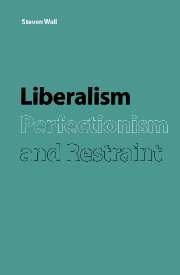Book contents
- Frontmatter
- Contents
- Acknowledgments
- Introduction
- 1 Perfectionism
- Part I The rejection of the bracketing strategy
- 2 The idea of restraint
- 3 Political liberalism and the bracketing strategy
- 4 Toleration, reasonable rejectability and restraint
- 5 Public justification and the transparency argument
- Part II Autonomy and perfectionism
- Bibliography
- Index
4 - Toleration, reasonable rejectability and restraint
Published online by Cambridge University Press: 09 November 2009
- Frontmatter
- Contents
- Acknowledgments
- Introduction
- 1 Perfectionism
- Part I The rejection of the bracketing strategy
- 2 The idea of restraint
- 3 Political liberalism and the bracketing strategy
- 4 Toleration, reasonable rejectability and restraint
- 5 Public justification and the transparency argument
- Part II Autonomy and perfectionism
- Bibliography
- Index
Summary
In chapter 3 I considered and rejected two arguments for restraint: the pragmatic argument and the argument from political justification. I tried to show that neither argument provides moral reasons for the model citizen to exercise restraint. I turn now to a third argument. This argument invokes the value of toleration. Since toleration has moral value, it is the right type of argument.
This chapter divides into seven sections. The first analyzes the concept of toleration. The second discusses two justifications of toleration that the model citizen can endorse. The third contrasts these justifications of toleration with Rawls' “democratic idea” of toleration. Then in the next three sections the case against the democratic idea of toleration is presented and developed. The final section concludes the chapter with some reflections on political justification and moral luck.
The concept of toleration
Let us begin with a few words about the concept of toleration. I will not put forward a complete analysis of the concept. Instead, I will simply identify some of its main features as it is used in contemporary political theory. This should suffice for present purposes.
Tolerance is not the same as nonchalance. The person without a concern or care has no disposition to repress, harm or offend others. Effortlessly, he welcomes diversity; and when confronted with disagreeable things such as prostitution or cruelty to animals he feels no disgust or moral outrage. Whatever else may be said in his favor, the nonchalant person is not tolerant. Lacking convictions, he is disabled from displaying it.
- Type
- Chapter
- Information
- Liberalism, Perfectionism and Restraint , pp. 63 - 104Publisher: Cambridge University PressPrint publication year: 1998



